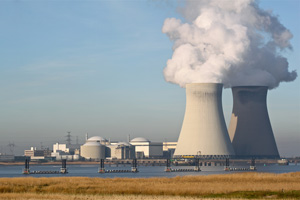
Thousands of Nuclear Regulators Sent Home During Shutdown
Harvey Wasserman
All of this has hurt the nuclear industry. A long, drawn-out shutdown would have gone further, killing the re-licensing process and the endless flow of rubber-stamped regulatory exceptions on which the industry thrives. An unmanageable accident in the midst of this shorthanded mess would have been another chime in a chorus of death knells.

Shutterstock photo of a nuclear power plant .
The shutdown of the U.S. government has made our nation's nukes more dangerous than ever.
All but 300 of the Nuclear Regulatory Commission's 3,900 employees have been furloughed during the government shutdown. The NRC must monitor safety at the 100 reactors still licensed to operate in this country. That works out to about three staff per reactor, except that only half the 300 are resident inspectors. The nation's nukes may be flying all but blind.
"Yes, I am worried," said Ed Lyman, senior scientist with the Union of Concerned Scientists, as the furloughs began. Among other things, Lyman complained that the cutbacks would delay the safety changes being made by the NRC in response to the Fukushima Daiichi meltdown in Japan. "But the most acute issue is assuring that the operating reactors" are safe. "I'm not expecting overnight that it's going to be a collapse of safety," he said. "You can only hope for the best that a situation doesn't occur during this time."
"The shenanigans by Republicans in Washington have put the safety and health of our entire nation, and the world, at severe unthinkable risk," says Susan Shapiro, a New York organizer now circulating a petition demanding that all of the U.S.' commercial reactors close down until the federal government reopens at full strength.
The commission has denied that there's been a problem. According to Mark Sartorius, executive director for operations, thanks to a carryover fund, "the NRC was able to continue to keep its doors open a bit longer than the rest of the federal government." But, he said, most of the commission has been "shut down due to the lapse in appropriations. Furlough notices were sent to all employees. At this time, only about 300 of our 3,900 staff members are reporting to duty. That number includes the resident inspectors, who continue to do their job at the nuclear power plants in your communities."
Has the safety of our reactor fleet been compromised? Hell yes. A disaster, whether caused by an earthquake, tsunami, equipment breakdown or human error, would find the regulators seriously shorthanded. The NRC's ability to deal with a nuclear crisis is dubious to begin with. But since Oct. 10, when the furloughs hit, there's been virtually nobody home at all.
Meanwhile, many of the red tape services the commission does for the industry have also been shut down. The paperwork the NRC routinely provides the industry has stopped flowing, further slowing the alleged renaissance of a technology powering its way into the dustbin of history. Hearings have been canceled, licenses delayed and paperwork detoured. (A proposed $8.5 billion loan guarantee for two reactors under construction in Georgia is still tied up at the Department of Energy despite having been endorsed by President Obama several years ago.)
All of this has hurt the nuclear industry. A long, drawn-out shutdown would have gone further, killing the re-licensing process and the endless flow of rubber-stamped regulatory exceptions on which the industry thrives. An unmanageable accident in the midst of this shorthanded mess would have been another chime in a chorus of death knells.
The nuclear industry is already hurting in parts of the world that have stayed open for business. A proposed $10 billion double-reactor project in Ontario, Canada, has just been canceled. "New nuclear will not be part of the long-term energy plan," says Ontario Energy Minister Bob Chiarelli. Even more ominous, delays have come to a critical construction project in China's Zhejiang province. The world's first "third-generation" reactor, a Westinghouse AP1000 design, has been slowed by safety concerns. "Our state leaders have put a high priority on [nuclear safety] but companies executing projects do not seem to have the same level of understanding," says Li Yulun, an industry veteran.
A safety hold at a Chinese construction project likely stems from increased angst over Fukushima, just a few hundred miles from the Chinese border. More than 30 reactors are proposed or under construction in China, far more than anywhere else on Earth. If there is such a thing as a "nuclear renaissance," its theme song is in Chinese.
But China's nuclear push has been hammered by Japan's nuclear catastrophe, as some 400 tons of extremely radioactive fuel rods still hang in the air over Fukushima No. 4.
Chinese and American regulators have each gone into a deep re-evaluation mode since the March 2011 disaster. The Chinese put a hold on dozens of proposed new projects. That freeze may have been lifted, but a strong grass-roots anti-nuclear movement has arisen in the Middle Kingdom. It may mean that new Chinese nukes could swing in the air until those rods come down at Fukushima No. 4, which by all accounts will take at least a year.
In the United States, the government shutdown put a hold on any new "lessons learned" regulations the NRC may want to compose. The long-term impact is unclear, but the tea party has delayed the regulators' Fukushima deliberations into a red zone where the global focus can only escalate. More than 130,000 people from all over the world have signed petitions at http://www.nukefree.org and elsewhere, demanding a global takeover at Fukushima.
With concern growing abroad, and no one watching the store at home, Congress has mercifully voted to end the government shutdown. Let's hope nothing happened to any of our nukes
Submitters Bio:
HARVEY WASSERMAN'S HISTORY OF THE US is available at http://www.harveywasserman.com/, as is A GLIMPSE OF THE BIG LIGHT and clues to the whereabouts of the Holy Grail.
http://www.opednews.com/populum/printer_friendly.php?content=a&id=171882
